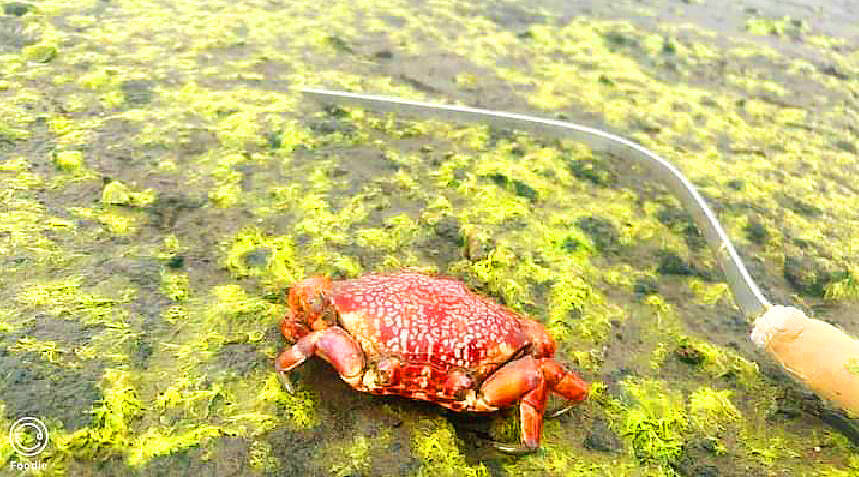A rare sighting of a highly toxic devil crab (Zosimus aeneus) was last week reported in a residential area in Penghu County, the Fisheries Research Institute said on Sunday.
Penghu Marine Biology Research Center director Justin Hsieh (謝恆毅) said that the crab was spotted on Friday night on a street in Longmen Village (龍門) in Husi Township (湖西) on the eastern part of Penghu’s main island.
The 10cm crab likely escaped after being caught by a fisher in a bottom gillnet, and was taken by the center for use as a research specimen after it was reported, Hsieh said.

Photo courtesy of Gan Tsui-ling
Devil crabs are found in tropical waters throughout the Indian and Pacific oceans, but are relatively rare in Penghu, he said.
Although less toxic than the more common mosaic reef crab, devil crabs contain significant concentrations of tetrodotoxin and saxitoxin, which are not destroyed when cooked, he said.
In terms of appearance, devil crabs have an oval, smooth carapace marked with yellow-orange to orange-red patches, he said.
While the waters around Penghu are home to a large variety of edible crab species, Hsieh urged people to exercise caution and check with experts at the research center before consuming unidentified crab species that are reddish or especially striking in color.

A preclearance service to facilitate entry for people traveling to select airports in Japan would be available from Thursday next week to Feb. 25 at Taiwan Taoyuan International Airport, Taoyuan International Airport Corp (TIAC) said on Tuesday. The service was first made available to Taiwanese travelers throughout the winter vacation of 2024 and during the Lunar New Year holiday. In addition to flights to the Japanese cities of Hakodate, Asahikawa, Akita, Sendai, Niigata, Okayama, Takamatsu, Kumamoto and Kagoshima, the service would be available to travelers to Kobe and Oita. The service can be accessed by passengers of 15 flight routes operated by

Chinese spouse and influencer Guan Guan’s (關關) residency permit has been revoked for repeatedly posting pro-China videos that threaten national security, the National Immigration Agency confirmed today. Guan Guan has said many controversial statements in her videos posted to Douyin (抖音), including “the red flag will soon be painted all over Taiwan” and “Taiwan is an inseparable part of China,” and expressing hope for expedited reunification. The agency last year received multiple reports alleging that Guan Guan had advocated for armed reunification. After verifying the reports, the agency last month issued a notice requiring her to appear and explain her actions. Guan

GIVE AND TAKE: Blood demand continues to rise each year, while fewer young donors are available due to the nation’s falling birthrate, a doctor said Blood donors can redeem points earned from donations to obtain limited edition Formosan black bear travel mugs, the Kaohsiung Blood Center said yesterday, as it announced a goal of stocking 20,000 units of blood prior to the Lunar New Year. The last month of the lunar year is National Blood Donation Month, when local centers seek to stockpile blood for use during the Lunar New Year holiday. The blood demand in southern Taiwan — including Tainan and Kaohsiung, as well as Chiayi, Pingtung, Penghu and Taitung counties — is about 2,000 units per day, the center said. The donation campaign aims to boost

The Central Weather Administration (CWA) said a magnitude 4.9 earthquake that struck off the coast of eastern Taiwan yesterday was an independent event and part of a stress-adjustment process. The earthquake occurred at 4:47pm, with its epicenter at sea about 45.4km south of Yilan County Hall at a depth of 5.9km, the CWA said. The quake's intensity, which gauges the actual effects of a temblor, was highest in several townships in Yilan and neighboring Hualien County, where it measured 4 on Taiwan's seven-tier intensity scale, the CWA said. Lin Po-yu (林柏佑), a division chief at the CWA's Seismological Center, told a news conference